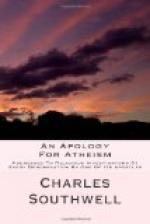Now, the reader has seen that the hypothesis of ’an intelligent cause of things’ involves difficulties, greater, infinitely greater than the one difficulty, involved in the hypothesis that things always existed. He has seen the folly of explaining natural, by the invention of supernatural mystery, because it manifestly violates a rule of philosophising, the justness of which it would be ridiculous to dispute. Having clearly perceived thus much, he will perhaps think it rather ’too bad’ as well as absurd, to call Atheists ‘madmen’ for lacking faith in the monstrous dogma that nature was caused by ’something amounting to nothing’ itself uncaused.
There is something. That truth admits not of being evidenced. It is, nevertheless, accepted. It is accepted by men of all religious opinions, equally with men of no religious opinions. If any truth be self evident and eternal, here is that truth. To call it in question would be worse than idle. We may doubt the reality of an external world, we may be sceptical as to the reality of our own bodies, but we cannot doubt that there is something. The proposition falls not within the domain of scepticism. It must be true. To suppose it false is literally impossible. Its falsehood would involve a contradiction, and all contradiction involves impossibility. But if proof of this were needed, we have it in the fact that no man, sage or simple, ever pretended to deny there is something. Whatever men could doubt or deny they have doubted or denied, but in no country of the world, in no age, has the dogma—there is something, been denied or even treated as doubtful. Here then Atheists, Theists, and Polytheists agree. They agree of necessity. There is no escape from the conclusion that something is, except we adopt the unintelligible dogma there is nothing, which no human being can, as nothing amounts to nothing and of what amounts to nothing no one can have an idea. To define the word something by any other word, would




